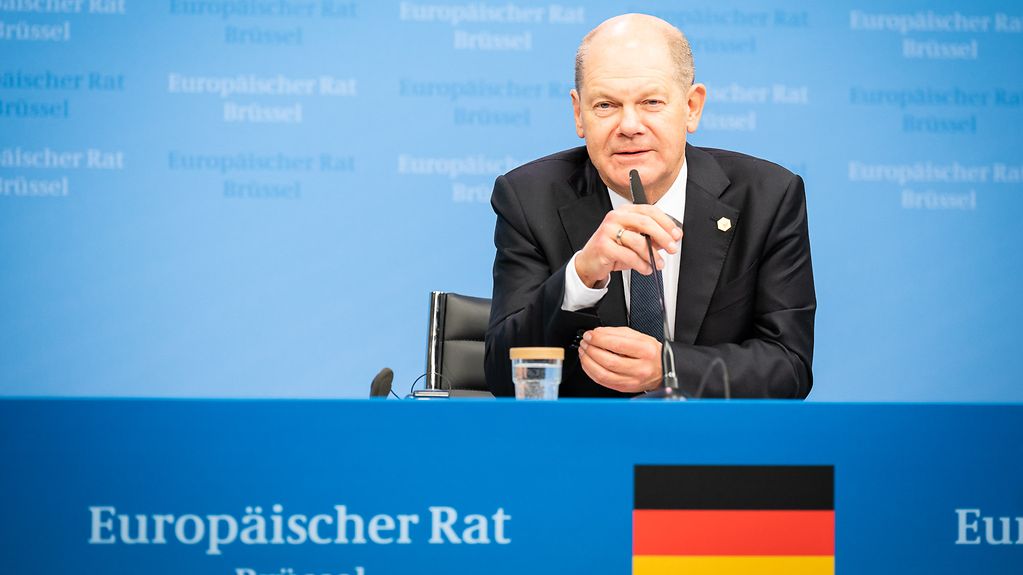Special meeting of the European Council
The European heads of state and government achieved important results at the European Council: a further 500 million euros for Ukraine, strengthening the EU's internal market, and more effective controls at the EU's external borders. According to Federal Chancellor Scholz, everyone was very moved by President Zelensky's personal participation.
4 Min. Lesedauer

Federal Chancellor Scholz after the European Council meeting: "The fact that the EU and Ukraine are standing together sends a strong message."
Foto: Federal Government/Kugler
Federal Chancellor Olaf Scholz described the meeting of the heads of state and government in Brussels as "a truly extraordinary European Council, and one that included many emotional moments". The heads of state and government were also preoccupied with the earthquake catastrophe in Turkey and Syria, which occurred just a few days before; in a joint letter to the Turkish President, they conveyed their sympathy to Turkey and offered further support. Scholz emphasised the fact that help from Germany and the EU was already underway saying that: "The EU states alone have sent more than 1600 aid workers to the crisis zones.
An emotional meeting with President Zelensky
"Another extremely emotional moment was the conversation with Ukrainian President Zelensky," said Scholz, "his personal participation in this European Council was very moving for everyone I saw gathered there.” Zelensky had already participated in previous meetings of the European Council online. His personal appearance in Brussels, shortly before the anniversary of Russia's attack on Ukraine, "is also a symbol of the Ukrainians' will to resist and a strong sign that the European Union and Ukrainians are standing shoulder to shoulder." The European Council's conclusion points out that Ukraine's future lies in the European Union.
Further support for Ukraine
The EU has approved a 7th military assistance package of €500 million for Ukraine under the European Peace Facility in addition to which, the EU's military assistance mission to train an initial 30,000 Ukrainian soldiers will be launched in 2023.
Of the EU states, Germany is providing the most support to Ukraine in the form of humanitarian, financial, and arms deliveries. Federal Chancellor Scholz welcomed the fact that the Ukrainian President Zelensky "once again specifically thanked Germany for its contribution".
The results of the special meeting of the European Council on 9 February 2023 are set out in the conclusions document.
Making Europe more competitive
The heads of state and government also exchanged views about the EU's competitiveness at the special meeting of the European Council in Brussels. The discussion was based on the Commission's communication on a "Green Deal Industrial Plan", which was published on 1 February. Based on this, the EU decided upon simpler and swifter aid procedures. Processes will also be put in place to make existing EU funds available on a more flexible basis and to simplify and speed up administrative and approval procedures.
Scholz stressed the fact that funds were available for all these tasks, for example from the NextGenerationEU reconstruction plan, which, he said, would enable "all European countries to meet these challenges and benefit from future growth".
Avoiding an international subsidy race
The USA has started a discussion about the implications of this policy for Europe by announcing support programmes for the green industry. The Federal Chancellor welcomes the measures taken by the USA towards a green transition, but is determined to avoid an international subsidy race: "We are currently in discussions with the USA about not being treated worse than Canada and Mexico, their immediate neighbours, and we will also be keeping a close eye on our options for supporting investments in modernisation."
Progress on migration policy
Another topic of discussion at the special meeting of the European Council was the current migration situation in the European Union including the continuation of the reform of the common migration and asylum system. The European Council agreed to enhance border management, simplify repatriation procedures, and to step up efforts to combat people smuggling. "We are able to meet here to develop common positions that will help us for the future," said Scholz.
The Federal Chancellor stressed the importance of cooperating on migration policy with the countries of origin and transit countries: "Both of these are necessary to enable us to cope with the challenges associated with refugee migration," he said. Cooperation was important to return people who do not have the right to stay in the EU to their countries of origin. At the same time, he continued, this cooperation will facilitate the legal migration of skilled workers, which we need in the EU. "Because," as the Federal Chancellor explained, "the reality is that almost all European countries have a major need for skilled workers, which is why we need legal migration channels to ensure that we have enough workers in the future who will pay pension contributions and help to keep our economy running.”